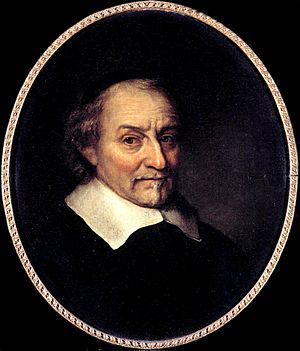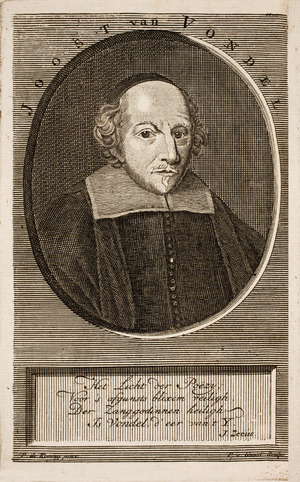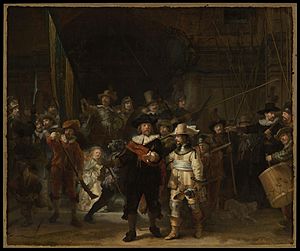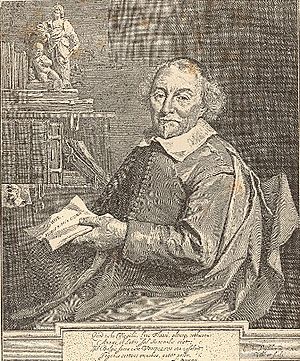Joost van den Vondel facts for kids
Quick facts for kids
Joost van den Vondel
|
|
|---|---|

Vondel in 1665
|
|
| Born | 17 November 1587 Cologne, Holy Roman Empire |
| Died | 5 February 1679 (aged 91) Amsterdam, Dutch Republic |
| Occupation | Writer, playwright |
| Period | Dutch Golden Age |
| Spouse | Mayken de Wolff |
| Children | 4 |
| Signature | |
Joost van den Vondel (born November 17, 1587 – died February 5, 1679) was a famous Dutch writer and playwright. Many people think he was the best poet of the 1600s during the Dutch Golden Age. He is considered a top figure in Dutch literature.
Vondel wrote many works throughout his long life. Some of his most famous plays, like Lucifer and Adam in Exile, were written when he was over 65 years old. His last play, Noah, was written when he was 80 and is still seen as one of his best.
His plays are still performed often today. His long poem Joannes de Boetgezant (1662), about John the Baptist, is called the greatest Dutch epic poem. For many years, his play Gijsbrecht van Aemstel was performed every New Year's Day from 1637 to 1968.
Contents
Early Life and Family
Vondel was born on November 17, 1587, in Cologne, which was part of the Holy Roman Empire. His parents, Joost van den Vondel the Elder and Sara Kranen, were Mennonites. They were religious refugees from Antwerp in the Spanish Netherlands.
In 1595, officials in Cologne told all Mennonites they had to leave. The Vondel family moved around, living in Frankfurt, Bremen, Emden, and Utrecht. They finally settled in Amsterdam in the new Dutch Republic.
Even in Amsterdam, Mennonites were not fully accepted. The main church was the Dutch Reformed Church. But Vondel's father became a Dutch citizen in 1597. This allowed him to start a successful silk business.
From age ten, Vondel learned proper Dutch and also French. He might have been a student of Willem Bartjens, a teacher he later honored in a poem. Since merchant sons did not go to Latin schools, Vondel taught himself New Latin as an adult.
He lived in Amsterdam among other Protestant refugees from Antwerp. By 1606, he joined a literary group called Het Wit Lavendel (The White Lavender). This group was started by people from the Spanish Netherlands. Vondel often signed his early poems with the motto Liefde verwinnet al ("Love conquers all"). These poems were about Christian faith and used ideas from Classical mythology.
In 1606, Vondel was baptized as an adult Mennonite. The next year, his father died, and Vondel joined the family business.
Becoming a Poet
Vondel started writing plays for the public theater in Amsterdam. This was when Amsterdam's theater was becoming very famous in Europe.
In 1612, Vondel published his first play, Het Pascha ("Passover"). This play told the story of the Exodus, when the Israelites were freed from slavery in Biblical Egypt. The play also compared this freedom to the Dutch Revolt against King Philip II of Spain.
When he was 23, Vondel married Mayken de Wolff. They had four children, but two of them died when they were very young.
Vondel continued to learn Latin and met famous poets like Roemer Visscher.
In his early life, Vondel strongly supported religious toleration. After a political trial in 1619, the Calvinist group called the Gomarists gained power. They made the Dutch Republic almost like a Theocracy. People who were Roman Catholic, Anabaptist, or Arminian faced religious persecution. They had to worship in secret churches.
These events made Vondel question his own religious beliefs. As a Mennonite, he was not supposed to get involved in government matters. But the events in the Republic made him very sad and sick. He suffered from major depression in 1620 and 1626.
During this time, Vondel wrote many plays and satires (sarcastic writings) that criticized the Gomarists. This made him unpopular with both the church and the government. In October 1620, Vondel left his role as a leader in his Mennonite church.
In 1620, Vondel finished his play Hierusalem verworst ("Jerusalem Destroyed"). This play was inspired by ancient Roman and French plays. He signed it with the motto, "Door Een is 't nu voldaen" ("By One all is now fulfilled").
A Voice of Dissent
In 1622, Vondel challenged the Gomarists by writing poems honoring Erasmus of Rotterdam. He also gave shelter to a minister named Coenraad Vorstius, who was a fugitive. When Vorstius died, Vondel wrote a sad poem for him.
Vondel also spent more time studying Roman poetry by writers like Ovid, Virgil, and Horace. He also studied philosophy and logic. He wanted to improve his artistic skills.
His 1625 play Palamedes tried to avoid censorship. It told the story of a false accusation during the Trojan War, but it was really about the trial of a Dutch politician. Vondel's play was popular and sold many copies, even though he was fined for it. To improve his Latin, Vondel translated Roman plays into Dutch.
Vondel's wife, Mayken de Wolff, died in 1635.
In 1637, Vondel finished Gysbrecht van Amstel. This play was meant to be performed on Christmas Day to celebrate the new Amsterdam theater. The play told the story of Amsterdam's siege in the 1200s. However, the Dutch government banned it because it showed a Catholic Mass on stage. A heavily censored version was finally performed in 1638.
Vondel became very interested in theatre of ancient Greece. In 1639, he translated Sophocles' play Electra.
Around 1641, Vondel became a Roman Catholic. We don't know all the reasons, but he was against Calvinist censorship and persecution. He also loved a Catholic woman. These things likely played a part.
Vondel's conversion was a shock to many Dutch people. But he truly believed in his new faith. He strongly defended Catholic teachings in his writings. In 1645, he wrote Altaargeheimenissen ("Mysteries of the Altar") to explain the Catholic belief in the Blessed Sacrament. He also defended his faith in De heerlijkheid der kerke ("On the Church").
In 1646, Vondel honored Mary, Queen of Scots in his play Maria Stuart or Martyred Majesty. He showed her as a Catholic martyr and a victim of the Protestant Queen Elizabeth I. Dutch censors saw this play as a comment on the English Civil War. So, Maria Stuart was also banned, and Vondel was fined.
During this time, Vondel knew Rembrandt van Rijn, a famous Dutch painter. Vondel wrote poems about Rembrandt's paintings. Rembrandt also drew characters from Vondel's Gysbrecht van Amstel. Some people even think Rembrandt's famous painting The Night Watch might show a scene from Vondel's play.
In 1654, Vondel published his most famous play, Lucifer. This play was inspired by the ancient Greek idea that a hero in a tragedy should have flaws. In the play, the Archangel Gabriel announces the fall of Adam and Eve.
Vondel believed in monarchy (rule by a king or queen). He dedicated Lucifer to the Holy Roman Emperor Ferdinand III. Vondel used the play to argue that a good ruler's power comes from God and should not be challenged. He used the story of the revolt in Heaven to criticize Calvinism and the English Civil War. He even questioned the Dutch Revolt against King Philip II of Spain.
Because the play was set in Heaven and showed the fall of angels and humans, the Dutch Reformed Church did not like it. Lucifer was banned after only two performances. Its copies were taken away. Church leaders also spoke out against it. But this ban made the play so popular that four editions were printed in its first year (1654).
The theater lost a lot of money because Lucifer was banned. Vondel tried to help by writing another play, Salmoneus, based on Greek mythology. This play was about a king who wanted to be worshipped like the god Zeus. But the government still prevented Salmoneus from being performed until 1657.
Vondel's plays were often banned because the church leaders wanted to control religious ideas. By putting Bible stories on stage, Vondel was challenging their power.
His 1659 play Jeptha, based on the Book of Judges, also used the structure of Greek Tragedy. But Dutch theatergoers were starting to prefer French-style plays.
Between 1659 and 1667, Vondel published ten tragedies. He translated Greek plays like Oedipus Rex and Iphigenia in Tauris into Dutch. He also wrote new plays about figures from the Old Testament who faced big changes in their lives. These included plays about King David and his son Absalom, and about Samson.
Later Life and Legacy
In 1663, Vondel wrote Batavische gebroeders ("The Batavian Brothers"). This play was about a revolt against the Roman Empire in 69 AD. Vondel showed the leaders of this revolt as heroes and ancestors of the Dutch people.
In 1667, Vondel finished Noah, or the Downfall of the First World. This play was meant to be part of a series with Lucifer and Adam in Exile. The series was about the fall of mankind and the hope for salvation.
Vondel lost his money trying to pay his late son's debts. He died at 91 years old on February 5, 1679. To honor him as the greatest poet of the Dutch Golden Age, Vondel was carried to his grave in Amsterdam's Nieuwe Kerk by many other poets.
Influence on John Milton
In the 1880s, some scholars suggested that the English poet John Milton was inspired by Vondel's plays Lucifer (1654) and Adam in Ballingschap (1664). Milton later wrote his famous long poem Paradise Lost (1667).
Even though Vondel and Milton had different religious views, their works have similarities. Both focus on Lucifer, describe a battle in heaven, and show Adam and Eve leaving Paradise.
For example, here's a quote from Vondel's Lucifer: "Is ’t noodlot, dat ick vall’, van eere en staet berooft,
Laet vallen, als ick vall’, met deze kroone op ’t hooft,
Dien scepter in de vuist, dien eersleip van vertrouden,
En zoo veel duizenden als onze zyde houden.
Dat valle streckt tot eer, en onverwelckbren lof:
En liever d’ eerste Vorst in eenigh laeger hof,
Dan in ’t gezalight licht de tweede, of noch een minder
Zoo troost ick my de kans, en vrees nu leet noch hinder."
This translates to: Is it fate that I will fall, robbed of honor and dignity,
Then let me fall, if I were to fall, with this crown upon my head
This scepter in my fist, this company of loyals,
And as many as are loyal to our side.
This fall would honor one, and give unwilting praise:
And rather [would I be] foremost king in any lower court,
Than rank second in most holy light, or even less
Thus I justify my revolt, and will not fear pain nor hindrance.
Now compare it to a quote from Milton's Paradise Lost: "Here may we reign secure, and in my choice To reign is worth ambition, though in Hell. Better to reign in hell than serve in heaven."
These similarities led a Canadian poet and scholar named Watson Kirkconnell to translate Vondel's plays into English. He believed Milton knew Vondel's work. Kirkconnell even suggested that Milton's play Samson Agonistes was influenced by Vondel's Samson or Holy Revenge.
Vondel's Lasting Impact
Many people compare Vondel to William Shakespeare in England. He is seen as the most important literary figure in Dutch history.
However, Vondel remained a controversial figure, especially among strict Calvinists. His first biographer, Geeraardt Brandt, did not think highly of Vondel's Catholic beliefs.
But other writers praised Vondel's skill with the Dutch language. By 1730, Vondel's writing style had become the standard for poets. However, his Catholicism was often ignored or downplayed.
When Catholics in the Netherlands finally gained full rights during the Napoleonic Wars, Vondel became a hero to them. They saw him as a champion of the Counter-Reformation and a great Baroque poet, like the painter Peter Paul Rubens.
In the 1800s, people celebrated Vondel with literary festivals. There were also debates about the Catholic ideas in his plays.
All of Joost van den Vondel's works were published in 10 volumes between 1927 and 1937.
Since the 1960s, interest in Vondel has decreased in the Netherlands. His plays often have Christian themes, which are less popular now. Many Dutch people today find his old literary language hard to understand. Like Shakespeare's plays, Vondel's long speeches can be challenging for modern audiences.
Even so, the Dutch five guilder banknote featured Vondel's picture from 1950 until 1990.
Amsterdam's largest park, the Vondelpark, is named after him. There is a statue of Vondel in the park. Also, there is a Vondelstraße in his hometown of Cologne.
The Dutch people are still very proud of Vondel. They often call him "the Prince of our Poets."
Plays
His plays include:
- The Passover or the Redemption of Israel from Egypt (1610)
- Jerusalem Destroyed (1620)
- Palamedes (1625)
- Hecuba (1626)
- Joseph (1635)
- Gijsbrecht van Aemstel (1637)
- The Maidens (1639)
- The Brothers (1640)
- Joseph in Dothan (1640)
- Joseph in Egypt (1640)
- Peter and Paul (1641)
- Mary Stuart or Tortured Majesty (1646)
- Lion Fallers (1647)
- Solomon (1648)
- Lucifer (1654)
- Salmoneus (1657)
- Jephthah (1659)
- David in Exile (1660)
- David Restored (1660)
- Samson or Holy Revenge (1660)
- The Sigh of Adonis (1661)
- The Batavian Brothers or Oppressed Freedom (1663)
- Phaeton (1663)
- Adam in Exile from Eden (1664)
- The Destruction of the Sinai Army (1667)
- Noah and the Fall of the First World (1667)
Commemoration
The Vondelpark in Amsterdam is named after him. You can find a statue of Vondel in the northern part of the park. There is also a Vondel Street in his native Cologne, called the Vondelstraße.
From 1950 to 1990, the Dutch five guilder banknote featured Vondel's portrait.
All of Joost van den Vondel's works were published in 10 volumes between 1927 and 1937.
See also
 In Spanish: Joost van den Vondel para niños
In Spanish: Joost van den Vondel para niños
 | Madam C. J. Walker |
 | Janet Emerson Bashen |
 | Annie Turnbo Malone |
 | Maggie L. Walker |




